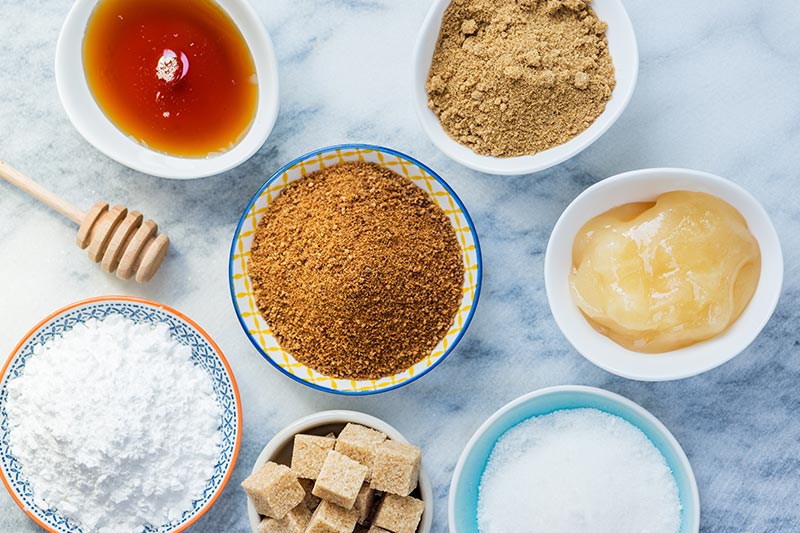A guide for diabetics to help satisfy their sweet tooth
It’s a myth that diabetic patients are not allowed to enjoy desserts because they spike their glycemic levels, when actually, any carbohydrate - in this case, sweets in moderation is acceptable, as long as you stick to your medication, lifestyle modifications, and regular glycemic health checks.
Although it is wise not to consume white table sugar, there are numerous alternatives that can be divided into natural and artificial sweeteners. Read on to learn what kind of sweeteners you should use the next time if you have sweet cravings(https://sandhus.com/blogs/wellness-blog/l-glutamine-help-in-sugar-craving?_pos=1&_sid=b4eca3495&_ss=r )
Natural sweeteners that will increase blood sugar
Although not white sugar, these ingredients are used as substitutes in many desserts, even diabetic-friendly ones. The basic structure of these ingredients is carbohydrates that will raise your glycemic levels.
Honey
Honey is a wonderful ingredient but not so for diabetics. It is loaded with fructose which is a carbohydrate - capable of increasing your glycemic levels. So if you ever want to take honey make sure you incorporate it in the smallest amount possible and only on rare occasions.
Agave Nectar
Agave nectar is also another commonly used substitute; tapped from the agave plant, but nonetheless, it performs the same function as sugar. It is found that agave nectar is sweeter than sugar but provides moderately low calories. The nectar is about 90% fructose which places it high on the glycemic index but not as high as sugar and honey. So just like honey make sure to include agave nectar in small amounts in your desserts and as rarely as possible.
Natural sweeteners that will not increase glycemic levels
Stevia
Stevia is a natural sweetener extracted from the leaves of the stevia plant (Stevia rebaudiana Bertoni) that is most commonly seen in South America. The interesting thing about stevia is that it does not increase glycemic levels; 1g of stevia provides zero calories although you don’t need 1g to sweeten your food. Stevia is 200-300 times sweeter than sugar so a little goes a long way.
sugar-bowl
Stevia is produced in different forms: stevia powder which can be used to sweeten up your cookies and cakes, stevia nectar which can be added to your coffee, teas and breakfast bowls, stevia drops are also available in case you want to sweeten up your juice or any refreshment on the go.
Monk Fruit Extract
Monk fruit extract also known as Luo hango or Swingle fruit extract is obtained from a plant that originates from Southern China. This extract is sweeter than sugar but just like stevia it provides zero calories and hence will not spike your glycemic levels, but it does provide a lasting fruity taste.
Although both stevia and monk fruit extract do not increase glycemic levels make sure to read the product labels before purchasing to ensure that there are no added sugar or other additives.
Artificial Sweeteners
These are FDA-approved synthetic sweeteners that have zero calories, hence they do not increase your glycemic levels.
- Acesulfame potassium or ace K
- Aspartame
- Saccharin
- Sucralose
- Neotame
- Advantame
The above sweeteners are widely found in processed foods and they are known as intense sweeteners because they are sweeter than sugar and a little amount is enough to sweeten your food.
Sugar Alcohols
These are the most popular additives in sugar-free foods they provide less sweetness than sugar and they contain low calories. If 1 g of sugar gives you 4 calories, sugar alcohols give you 2.5 calories, so they increase glycemic levels, but not as much as regular table sugar. Some examples are Isomalt, Maltitol, Mannitol, Sorbitol, and Xylitol. They all end in “-ols” which is due to the alcohol group in their chemical structure. However, if used in large quantities these sugar alcohols are said to produce a laxative effect, and is better to consume them in moderation.
For diabetics, moderation is key especially when it comes to sweeteners, hence it is wiser to choose natural sweeteners that do not increase your glycemic levels compared to artificial ones and save sweeteners such as honey and agave nectar for special occasions.
Supplements in Sugar Craving
Supplements can play a role in controlling sugar cravings by addressing potential deficiencies, modulating blood sugar levels, or affecting the neurological pathways linked to appetite and cravings. Here's a breakdown of how some supplements might work to control sugar cravings:
Blood Sugar Stabilization: Some supplements can help stabilize blood sugar levels, reducing the peaks and troughs that might lead to sugar cravings.
Chromium: Improves the action of insulin and can help keep blood sugar levels stable.
Berberine: Has been shown to help regulate glucose metabolism, making it useful for stabilizing blood sugar levels.
Neurological Effects: Sugar cravings can also have a neurological basis, especially if they are linked to mood or feelings of reward.
5-HTP: Increases the production of serotonin, a neurotransmitter that can influence mood and appetite. Low levels of serotonin can lead to sugar cravings as sugar boosts serotonin release.
L-Glutamine: This amino acid can act as a quick energy source for the brain, potentially reducing the immediate desire for sugar.
Gut Health: The gut microbiome can influence food choices and cravings.
Probiotics: By promoting a healthy balance of gut bacteria, probiotics help regulate sugar cravings, as some gut bacteria strains are believed to increase sugar cravings when they dominate the gut environment.






